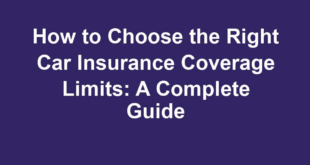When driving down the street, no one ever expects to get into a car accident. Unfortunately, even if you are an excellent driver, circumstances such as another person’s carelessness or bad weather can lead to a collision. Fortunately, collision car insurance provides an additional layer of protection should such an unlucky situation arise. In this article, we’ll explore the definition of collision car insurance and how it can help protect your vehicle from damage due to a collision.
1. Navigating the Fundamentals of Collision Car Insurance
Collision car insurance is an important factor to consider when driving. As a motorist, you should understand the basics of it to protect yourself from financial distress. Here are some tips on getting the most out of your policy:
- Identify Your Coverage Needs. Review your state’s laws and consider the type of automobile you have and your driving habits. By understanding the different insurance options available and the type of cover that fits you best, you can make an informed decision.
- Compare Policies. Get quotes from different providers and compare the policy coverage they offer, taking into account the premium cost. Consider only the level of coverage you need and the ability to customize your policy.
Take stock of the deductibles that come with the policy and clarify all your doubts with the insurer. Keep a record of the policy documents so that you can refer back to them in the future. Lastly, it’s always smart to review your policy periodically.
2. Discovering the Benefits of Protection
In the world of finance, protection takes on many forms. From insurance policies to choosing the right investments, it’s important to understand how to protect yourself in both the short and long-term. Investing in every asset involves risk, and understanding the benefits of protection can help you make the right decisions for you and your family.
When choosing the right protection, there are many benefits to think about:
- Peace of mind: Making sure your family is taken care of in the event of an untimely death or other unexpected circumstances provides comfort and security.
- Savings: Investing in the right protection can help you build financial savings over time.
- Risk management: No matter how prepared you are, life can be unpredictable. Protecting yourself and your family through insurance and other investments can help create a sense of security for the future.
By understanding the benefits of protection and investing in the right products, you can gain peace of mind and help ensure financial stability for your family in both the short and long-term.
3. Navigating Insurance Claims After an Accident
After a car accident, navigating insurance claims can be daunting for many. It’s essential to know what must be done to ensure fair compensation. The following steps will help make sense of the complex process.
- Gather Evidence: First and foremost, you should collect as much evidence of the accident as possible. This includes photos of the damaged car, police and medical records, and insurance documents. If a claim is made against you, having reliable evidence can prove your innocence.
- File a Claim: Once the evidence is collected, you can officially file a claim with your insurance company. Although the process may vary slightly between carriers, in general, you’ll need to provide a description of the accident and an estimate of the costs for repairs or medical bills.
If the claim is approved, you may have the option of getting a rental car while your primary vehicle is in the shop. Additionally, you’ll need to alert the other party’s insurance about the claim. This is important if you’re looking for further compensation.
4. What Your Policy Covers—and What It Doesn’t
Your company’s policy covers a lot—from behavior to timesheets to social media usage. It’s important to remember that there are some things your policy doesn’t cover: your policy cannot replace employment law or labor law. Bear this in mind when developing and enforcing the policy.
Every organization needs to think about what its policy does and does not cover. Here are some of the most common elements that are excluded from your policy:
- Individual wage and salary disputes
- Workplace accommodations
- Disciplinary action based on legally protected characteristics
- Minimum wage and overtime
By being aware of what areas are not included in your policy, you can more effectively protect your business and mitigate the risks that come with managing employees.
No matter your budget or the age of your car, investing in collision car insurance is a relatively small price to pay for the extra protection and peace of mind it will bring. Taking the time to research and choose the best coverage option for your specific needs is key in making sure you and your car are taken care of!





